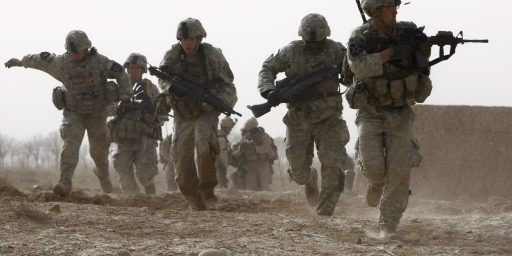Mercenaries Redux
Mercenaries in Afghan Case Get 8 to 10 Years in Prison (NYT)
Three Americans were sentenced here on Wednesday to 8 to 10 years in prison for running a private jail and torturing prisoners, after a panel of three Afghan judges rejected their claim that they were working for a Pentagon counterterrorist group led by Lt. Gen. William G. Boykin, the deputy undersecretary of defense for intelligence. Jonathan K. Idema, 48, a former member of the Special Forces, and Brent Bennett, 28, an Army-trained forward air controller, were sentenced to 10 years, and Edward Caraballo, 42, a journalist filming a documentary about them, was given 8 years. Four Afghans working for the men were given sentences of one to five years. The Americans stood still as they heard the sentences relayed by an interpreter. Behind them, the youngest defendant, a 15-year-old Afghan translator, began to cry.
The Americans immediately said that they had had been abandoned by their American masters because they had become a political liability. “This can only have been staged by the U.S. government – we were an embarrassment,” said Mr. Caraballo, an award-winning cameraman who says he was filming Mr. Idema’s counterterrorist operations. [***] American Embassy officials have said since the arrests on July 5 that as far as they knew neither Mr. Idema nor anyone in his group was working for a government agency. The military has issued statements saying Mr. Idema was impersonating government or military officials and did not represent either.
The article quotes extensively from a tape that would seem to indicate otherwise, however.
Jonathan Turley has an interesting related piece in LAT entitled “Soldiers of Fortune — at What Price?”
David A. Passaro was a mercenary working for the United States. A former Special Forces soldier, he was on the job for the American government in Afghanistan on June 19, 2003, when he was told to get information from a detainee named Abdul Wali. When Wali insisted that he knew nothing, Passaro allegedly beat him to death with a heavy metal flashlight. Now on trial for murder, Passaro is described in a recent criminal indictment as “a contractor working on behalf of the United States Central Intelligence Agency … engaging in paramilitary activities.” “Contractor” is the term used by the Defense Department to avoid more pejorative terms like “mercenary” to describe Washington’s growing shadow army.
*** In all, there are about 20,000 military contractors currently working in Iraq for the U.S. government, according to the Washington Post; that’s the equivalent of three army divisions of contractors. Soldiers-for-hire like Passaro are often employed (for as much as $200,000 a year) by former generals, who retired to run clandestine operations for profit and who have, in many cases, become millionaires from the secret budgets of the CIA and Defense Department.
Yes and no. Clearly, we are hiring mercenaries for use in combat operations. But most of the 200,000-odd contractors working in Iraq are performing combat service support missions–cooking food, driving trucks, and the like–and are not “mercenaries” in any meaningful sense.
In Iraq, they’re dying just like regular soldiers. To date, roughly 120 contractors have been killed there (although some were not involved in paramilitary activities). They include Vincent Foster, a former Marine sniper who was engaged in “skirmishes” in Iraq, and Scott Helvenston, who died guarding a convoy.
The growing use of contractors and freelancers for paramilitary work has fueled an industry of mercenaries that was long in decline. Consider the strange case of Idema. On July 5, 2004, Afghan police entered the private prison run by him in Kabul. They reportedly found three men hanging from the ceiling while five others were found beaten and tied in a dark small room. Idema, also a former Special Forces member, claimed to have been working with the CIA and offered to supply proof that high-ranking U.S. officials supported his operation. Idema’s case highlights the increasingly fluid definitions of soldiers, contractors and freelancers. While officials denied any contact with Idema’s operation, the Defense Department recently acknowledged it held an Afghan man in custody for two months after Idema delivered him to U.S. forces. Likewise, officials now admit that Idema sent messages and faxes to top Pentagon officials. Idema also reportedly arranged and participated in raids on homes with NATO forces in Kabul. [***] It is not clear whether Idema was actually employed by the U.S., but clearly he is part of a radically expanded market for soldiers of fortune, a market fueled by U.S. dollars.
*** There has never been a national debate on the use of mercenaries or on the rules governing their conduct. And, if some powerful forces in Washington have their way, there never will be. Washington’s clandestine army reportedly receives billions and employs tens of thousands. It is a growing dependence that could come back to haunt us. Like many nations in history, we may find that it is far easier to hire mercenaries than to be rid of them.
Indeed. Men like Idema operate in a very shadowy world and ultimately work for themselves, not any government. It’s quite conceivable that he was hired to perform work for the U.S. government and wound up running his own freelance operation.






It would be interesting to see a comparison to the role of the privateers in the Revolutionary War.
or the buccaneers on the Spanish Main.